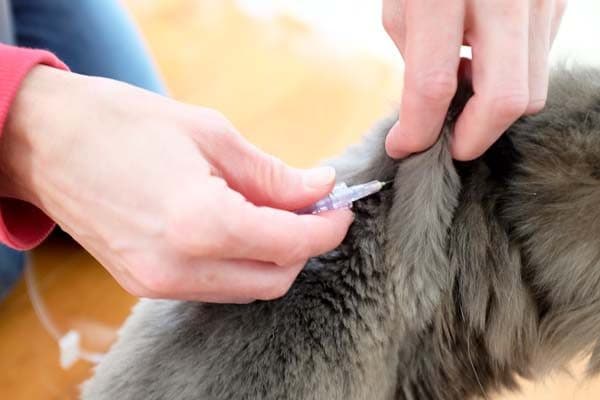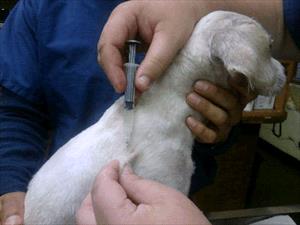Sub Q Shots For Dogs
The disease is spread from dog to dog through contact with feces. Vaccine Characteristics. A vaccine is available to prevent canine coronavirus infection. This vaccine may be included in combination vaccines that also protect dogs from canine distemper virus (CDV), canine parvovirus (CPV-2), and canine adenovirus type 2 (CAV-2). If the dog will not lick it on its own you can syringe feed by making a pocket on the side of the mouth by pulling the skin away from the teeth and slowly injecting the liquid into the pocket allowing the dog to swallow. You can also try to pick up some DogSure which can be purchased at some of the larger Pet shops.
Dexamethasone is a powerful anti-inflammatory, immunosuppressive drug that can treat several conditions in dogs. It’s more powerful than prednisone and 30 times stronger than the cortisol steroid hormones that dogs produce naturally in their adrenal glands.
This drug is prescribed for dogs who suffer from allergies or arthritis, as well as other conditions caused by the immune system’s overactive response to perceived threats.
It requires a prescription from your veterinarian. You should follow instructions closely, as misuse can result in further infections and side effects. You can easily order dexamethasone online from Chewy’s pharmacy with your vet’s prescription.
Here’s what you should know about the uses, dosage, and side effects of dexamethasone for dogs.
Uses Of Dexamethasone For Dogs
(Picture Credit: Getty Images)
Dexamethasone can be used to treat many issues in dogs. As an immunosuppressant, it can treat conditions where the immune system overreacts to perceived threats, thus causing inflammation and other problems.

It can also ease pain caused by inflammation in certain conditions, such as arthritis.
Here are some medical conditions in dogs that may be treated with dexamethasone:

- Allergies
- Swelling from inflammation
- Adrenal problems like Addison’s disease
- Systemic lupus
- Skin disease
- Colitis and other gastrointestinal problems
- Autoimmune disease
- Respiratory issues
- Liver disorders
- Hematologic disorders
- Inflammatory bowel disease
- Nervous system disease
- Tumor growth
- Shock
- Nephrotic syndrome
Dosage Of Dexamethasone For Dogs

(Picture Credit: Getty Images)
The following is a guideline for general use of this drug in dogs and must not replace your veterinarian’s advice for your individual dog.
The usual dosage of dexamethasone for dogs varies based on the condition that’s being treated.
For instance, treatment of inflammatory condition usually requires a dose of 0.1 to 0.3 mg per pound of body weight twice a day.
As an immunosuppressant, on the other hand, the dosage is higher — usually 1 to 3 mg per pound up to three times a day.
Other conditions may also require a dosage of anywhere from 0.1 to 3 mg per pound.
Of course, you must follow your vet’s instructions carefully. This is a powerful drug, so it’s easy to overdose on it, which can cause hormonal or metabolic changes that could result in death.
Do not stop treatment unless your vet tells you to do so, even if symptoms improve. Your vet can also adjust the dosage based on your dog’s needs.
Side Effects Of Dexamethasone In Dogs
There are many possible side effects for dogs who take dexamethasone. Furthermore, long-term use increases the risks that these effects will appear. If you see side effects in your dog that concern you, then let your vet know so they can adjust the dosage or treat the symptoms.
Here are several side effects that dogs might experience while taking dexamethasone:
- Appetite changes
- Increased thirst or urination
- Drowsiness
- Hyperglycemia
- Adrenal deficiency
- Poor healing from wounds
- Muscle loss
- Weakness
- Behavior changes
- Brain swelling
- Increased seizures
- Viral or bacterial infections
- Panting
- Vomiting
- Diarrhea
- Digestive tract ulcers
- Lethargy
- Skin thinning
- Pancreatitis
- Weight gain
Sub Q Shots For Dogs
Certain medical issues in dogs may worsen due to use of dexamethasone. Therefore, your vet should be aware of any other conditions your dog suffers from, such as diabetes, Cushing’s disease, heart problems, kidney disease, osteoporosis, glaucoma, or ulcers.
Your vet should also be aware of any other drugs your dog is taking, especially other steroids, immunosuppressants, or NSAIDs, as these can interact poorly with dexamethasone and cause serious problems.
As with almost all medication, there is also a risk of allergic reaction that can lead to anaphylaxis — a life threatening condition. Although these reactions are rare, you should watch for signs such as coughing, sneezing, difficulty breathing, itching, or other symptoms of allergic reactions. If you see these signs, then you must contact your vet immediately.
Subq Shots For Dogs
Has your dog ever taken dexamethasone? Was it an effective treatment? Then let us know in the comments below!